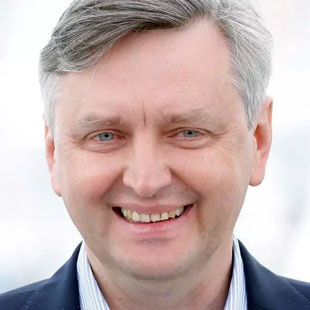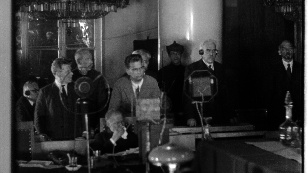
Sergei Loznitsa
Career
Украинский кинорежиссёр белорусского происхождения, сценарист, классик документального кино. Его работы получили признание в Европе. На счету режиссера около сорока наград различных кинофестивалей.
Date of birth
05.09.1964
Filmography
16
Moscow, USSR. 1930. The Pillar Hall of the State House of the Unions. A group of top rank economists and engineers is put on trial accused of plotting a coup d'etat against the Soviet government.
It's alleged that they made a secret pact with the French Prime Minister, Raymond Poincare, and with other Western political leaders, aiming to destroy the Soviet power, restore capitalism and break up the USSR. All charges are fabricated and the accused are forced to confess to the crimes they never committed. The court, presided by Andrey Vyshinsky, who later became known as the diabolical prosecutor, key-figure in Stalinist show trials and the advocate of mass repressions, delivers death verdicts.
Unique archive footage reconstructs one of the first show trials, masterminded by Stalin, which unfolds as a theatrical performance with actors - prosecutors, witnesses, defendants, judges - lying to themselves, to the audience and to the world. The drama is real, but the story is fake. The film gives an unprecedented insight into the origins of a deadly regime, which made the slogan "Lie is Truth" its everyday reality.
It's alleged that they made a secret pact with the French Prime Minister, Raymond Poincare, and with other Western political leaders, aiming to destroy the Soviet power, restore capitalism and break up the USSR. All charges are fabricated and the accused are forced to confess to the crimes they never committed. The court, presided by Andrey Vyshinsky, who later became known as the diabolical prosecutor, key-figure in Stalinist show trials and the advocate of mass repressions, delivers death verdicts.
Unique archive footage reconstructs one of the first show trials, masterminded by Stalin, which unfolds as a theatrical performance with actors - prosecutors, witnesses, defendants, judges - lying to themselves, to the audience and to the world. The drama is real, but the story is fake. The film gives an unprecedented insight into the origins of a deadly regime, which made the slogan "Lie is Truth" its everyday reality.

8
2018
128 min
Every year, on the 9th of May, people gather in Treptower Park in Berlin. They come dressed in their best outfits or in Soviet military uniform. They carry flags, banners and posters. They lay flowers at the monument to the Soviet soldier; they sing, dance and drink. They celebrate the victory of the Soviet Union over Nazi Germany. The film is a direct reportage from Treptower Park 72 years after the victory.

7
2018
94 min
A quarter of a century later, Sergei Loznitsa turns to the dramatic scenes of August 1991 and to an event that has entered modern European history as the moment of the "birth of Russian democracy." What actually happened in Russia in August 1991? What kind of force controlled the crowds on Palace Square in Leningrad? What kind of evidence is presented on the screen: the collapse of the regime or its creative rebranding? Who are these people looking at the camera, the winners or the victims?

9
2015
74 min
The first Jewish cemetery in Riga was opened in 1725, and burials continued there until the end of the 1930s. After German troops occupied Riga in 1941, the cemetery became a mass grave site for more than 1,000 Jews who were killed on the streets and in the houses of the Riga ghetto. After World War II, many of the gravestones from the cemetery were removed and used as building material. In the 1960s, the place was destroyed and renamed "Communist Brigades Park". In 1992, the park was renamed the "Old Jewish Cemetery". Currently, the park, located in one of the poorest areas of the city, called Maskachka (Maskava is the Latvian name for Moscow), is a popular place for idle drunks, local kids and American tourists. The film is dedicated to the memory of the Jews of Riga.

7
2015
20 min
A chronicle of the civil uprising against the regime of President Yanukovych that took place in Kyiv in the winter of 2013/14. The film shows the course of the revolution from peaceful rallies and half a million people gathered on Maidan Square to bloody street fights between protesters and riot police. MAIDAN is a portrait of an awakened nation. A nation that has realized its identity. Director Sergey Loznitsa rises above current political issues, he observes the nature of the popular uprising as a social, cultural and philosophical phenomenon. A powerful combination of enthusiasm, heroic resistance, terror, courage, aspirations, human solidarity, folk culture, passion and self-sacrifice. MAIDAN is a unique cinematic canvas, which combines classic film style and documentary relevance.

6
2014
130 min
In mid-June, the village of Santo Antonio de Mijoes da Serra in the Valdreu region of Portugal honors its patron saint. On this day, local farmers bring cows, horses, dogs, cats, chickens and rabbits to church for blessing. This ancient tradition is passed down from generation to generation, and now, like centuries ago, people and animals walk together along the mountain road to the temple and grace.

7
2012
40 min
In Soviet times, in the 50s, 60s and 70s, film magazines Our Land, Time Forward and others were regularly created and released on screens. Film magazines consisted of a set of stories about the life of the country and were built on the principle of a newspaper, which begins with big politics and ends with news of culture and sports. These magazines were created mainly to promote the Soviet way of life and only occasionally did something neutral and human appear in them. Film magazine plots are used as archival material in the film.

8
2008
83 min
A few hours in the village of Sumskoy Posad, a thousand kilometers north of St. Petersburg, on the shores of the White Sea. At the end of autumn, before the winter hides everything in the arctic night. In the depths of Russia, among the endless forests and potato fields. Among the people connected with the rest of the country only by a thin line of railway tracks and a muddy highway. But living not only in urgent needs.

8
2008
52 min
This film is about the fishing artel of the Pomors, whose life is devoted day after day to the work of their ancestors, to fishing on the White Sea. Against the background of a colorless sky, separated from the white snow by the horizon line, a man stands in the wind and tries to bite into the depths of the ice with an electric saw in order to cut a hole. All that the viewer manages to see on the screen is the deceptive simplicity of this space of life and boredom. But a thirty-minute contemplation of the silent hard work of fishermen in the icy cold makes you look at your life in a different way.

8
2006
30 min






